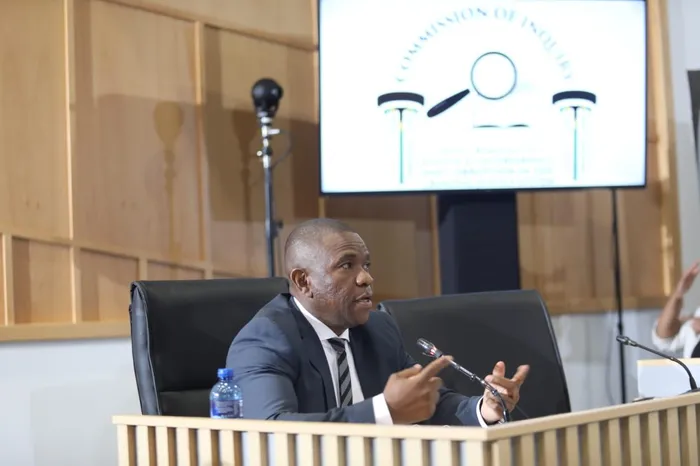
KwaZulu-Natal SAPS Commissioner Lieutenant-General Nhlanhla Mkhwanazi took centre stage as the first witness to testify at the Madlanga Commission of Inquiry.
Image: Oupa Mokoena / Independent Newspapers
KwaZulu-Natal SAPS Commissioner Lieutenant General Nhlanhla Mkhwanazi warned that the South African criminal justice system is teetering on the edge of collapse, and the Madlanga Judicial Commission of Inquiry is crucial in preventing a complete breakdown.
Mkhwanazi was the first witness to testify before the Commission at the Brigitte Mabandla Justice College in Pretoria on Wednesday.
He emphasised that criminality and corruption pose a significant threat to the independence of South Africa's justice system.
He said his concerns about political interference in police work are shared by many within the SAPS and referred to his July 6 briefing where he alleged that now suspended Minister of Police, Senzo Mchunu had colluded with “dodgy businesspeople” and criminal networks, including drug cartels, to sabotage SAPS operations.
Central to his explosive claims was the disbanding of the Political Killings Task Team, which had been investigating over 120 politically linked murder cases.
"I must indicate that the July 6 briefing was the result of collective efforts by various units within the SAPS,” he said.
“It reflects the shared concerns of officers across different ranks who are committed to resolving these issues so we can serve with honor and dignity.”
“I want to demonstrate that the criminal justice system has been subjected to a continuous threat as well as sabotage. We believe there is a real risk of total collapse if nothing is done,” Mkhwanazi told the Commission.
Mkhwanazi on Wednesday also confirmed that the embattled Political Killings Task Team is now fully funded and operational until March 2026. Mkhwanazi told the Commission that a renewed funding request submitted on July 23 was approved, ensuring the task team’s continued operations.
“The team is now fully deployed to do the work,” he stated.
Mkhwanazi outlined the origins, structure, and strategy of the task team, emphasising its “unmatched success rate” in tackling politically motivated violence.
He pointed to statistical evidence showing the unit’s effectiveness and confirmed that its mandate has recently expanded to include investigations into attacks on traditional leaders and corruption at the University of Fort Hare in the Eastern Cape.
Chief evidence leader Terry Motau had earlier outlined that the Madlanga Inquiry would be conducted in three phases.
He said the Commission will start by hearing extensive testimony from Mkhwanazi, who will be required to provide detailed accounts of his claims, present any supporting evidence, such as documents, communications, and reports.
He will also undergo questioning from evidence leaders and the Commission to clarify and verify the timelines and specifics of each allegation.
He emphasised that Mkhwanazi will identify the individuals and institutions involved, under oath and on record, while taking into account safety concerns that may require sensitive information to be heard in camera to protect ongoing investigations.
He revealed that witnesses corroborating Mkhwanazi's allegations will include National Commissioner General Fannie Masemola, members of the Political Killings Task Team, detectives, prosecutors, and experts.
Those implicated, including the suspended Minister of Police, Senzo Mchunu will be invited to provide testimony.
In the second phase, the Commission will thoroughly examine the evidence and, where necessary, evaluate rebuttals to the allegations made during Phase One.
Motau said: “Individuals and institutional representatives implicated by Lieutenant General Mkhwanazi’s statements and evidence - including, for instance, the suspended Minister of Police— - will be invited or, if necessary, compelled to appear before the Commission and provide testimony.”
In Phase Three, the final phase, the Commission will hear further testimony from Mkhwanazi and other key witnesses to respond to the perspectives and counter-allegations made by those implicated during Phase Two.
Motau said: “This phase will provide Lt Gen Mkhwanazi the opportunity to respond directly to any conflicting accounts, clarify points of contention and, where necessary, offer additional evidence or context. Should there be aspects where he recognises errors or omissions, this will be the appropriate juncture for such acknowledgements.”
Justice Mbuyiseli Madlanga noted in his opening remarks that the South African public's interest in the investigation is unsurprising, given the serious nature of Mkhwanazi's allegations made on July 6, 2025, regarding the alleged infiltration or undue influence on the criminal justice system.
“If the allegations are proved to be true, that spells doom for South Africa’s criminal justice system. A healthy criminal justice system is key to the rule of law and, in turn, to a functioning constitutional democracy,” he said.
Cape Times